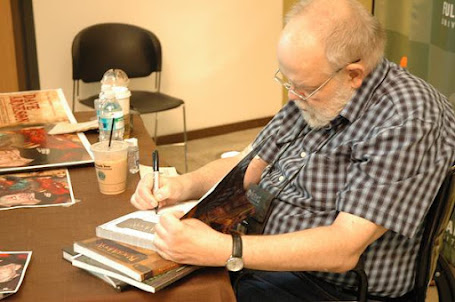Today the fantasy genre is everywhere. Rings of Power, Game of Thrones, World of Warcraft. All the streaming shows and video games are doing it in addition to novels, comics and other media. We are surrounded by it. When D&D was published in 1974, one of the reasons for its incredible success was probably that it tapped into this almost unknown part of the zeitgeist, finding an audience whose hunger for more fantasy content would only grow. D&D not only fed on the growing popularity of this new genre, but even came to shape how audiences understood what fantasy was all about. It is not surprising that when Peter Jackson's Lord of the Rings movies came out, they felt as much as D&D movies as they felt like the stories told by JRR Tolkien. RPGs of other genres were soon created, but none became as popular as D&D.
Almost decade earlier, Dave Arneson and his players had began experimenting with fantasy elements in their games. Adding laser guns into a wargame of Gauls vs. Romans back in 1969 is what Dave Arneson himself called his first venture into fantasy gaming in an interview with Space Gamer Magazine. Of course, this is a much wider definition of fantasy than we are accustomed to today, but was certainly a huge departure from the extreme focus of historical realism that was popular among many war gamers at this time.
So why did Dave Arneson select the fantasy genre when he decided to run his new Braunstein variant? David Wesely had always selected historical or contemporary real world settings for his Braunstein Games as had Duane Jenkins, running the Brownstone games for the Western setting. Was Dave simply part of the growing zeitgeist that would later project D&D into its extreme success?
I am sure that is part of. Greg Svenson, one of Dave's players, has told me that pretty much everyone in Dave's group would read any fantasy novel they could get their hands on as such books were far between especially compared to today's situation. However, I think there is also another reason why Dave decided to use the fantasy genre. Freedom.
Dave seems to have been in search of tools that would allow him to run games where he would have complete creative freedom to run games that were all about a fun experience for his players. It is well documented that he and others in his group were frustrated with the grognard wargamers with their obsessions with historical accuracy and how such arguments would completely derail many wargaming sessions.
With the Braunstein Games, the games were no longer confined to revolve around armed forces clashing. Shifting the focus towards individual characters meant the game could be about anything the players wanted. Merging this style of gaming with a world where anything was possible? This meant the ultimate freedom for both players and referees (or later Dungeon Masters).
-Havard






No comments:
Post a Comment